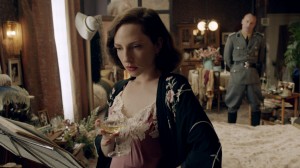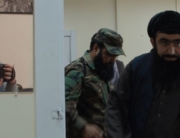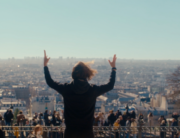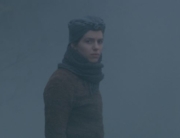Generation War sweeps away a half century of World War II clichés that most Americans usually see in the movies. First, it focuses on young everyman Germans caught up in their country’s militaristic culture under the Nazis, and then takes them east from Berlin to where the war had the greatest impact on the most people.
Director Philipp Kadelbach introduces each segment, month by month, season by season, starting from June 1941. Archival footage sets the stage for the experiences of the five fictionalized main characters, best friends since childhood. Narrator Wilhelm (Volker Bruch) is sent off to invade Russia by his proud, patriotic parents “to become a real man.” (His arc follows what producer Nico Hofmann’s father went through.) His folks are more anxious, though, about his intellectual brother Friedhelm (Tom Schilling), who just wants to go study with philosopher Martin Heidegger (shades of Hannah Arendt).
At a farewell party with his friends, immortalized in a group photo each will treasure, Wilhelm keeps at arms’ length from shy Charlotte (Miriam Stein), who has had a crush on him for years and is thrilled to also be headed to the front as a neophyte nurse supporting the troops to a quick victory. Her best friend, the flamboyant singer Greta (Katharina Schüttler), is so naïve about the Nazis that she doesn’t realize her idol, émigré Marlene Dietrich, is no longer politically correct. Meanwhile, she can’t keep her hands off her Jewish boyfriend, Viktor (Ludwig Trepte). He still dreams of being more of a fashion designer than a tailor like his father, whose shop has been shut down and apartment coveted by another family.
Greta’s delusion that she can help both Viktor and her performance ambitions by becoming the mistress of rising Gestapo colonel is the most familiar storyline of decadence and careerism in the Third Reich. The others’ complicated trek east, and their efforts to return, is marked on screen first by their distance to Moscow, then after defeat looms, the mileage back to Berlin, which marks their gradual disillusionment.
Wilhelm is a lieutenant and good at his job, even when sent on Pyrrhic missions, but he has to constantly cover for his brother’s hesitation in battles amidst the macho teasing by their fellow troops. As they march east, Friedhelm is so sensitive that he has to be corrected by an intelligence officer about his objections to shooting women and children: “They’re not civilians. They’re Jews.”
The critical 1943 defeat at Kursk that halted the German offense is also a turning point in the brothers’ psyches. The urban warfare of dodging the sniper shots by “Siberian hunters” is not just tense action, but keeps the focus on the reactions to death and mire. (Hint: amidst the mud and fog of war, listen for who is addressed as “lieutenant” to keep track of what is happening to whom.) All this occurs pretty much before the Americans were fighting the Germans in Europe.
Charlotte also copes with her first experiences of bloody triage at a crowded field hospital, and feels she is being loyal to the cause by outing a local doctor as Jewish. She steels herself against treating partisans, and then the ruthlessness of Russian liberators, and learns to drown out patients’ screams by blasting patriotic music (when she’s not listening to Greta’s romantic hit song on the radio). A dramatic coincidence is staged to get as many of the friends together as possible in the midst of the war when Greta entertains the troops near the hospital (an ironic mirror image of Dietrich’s brave bolstering of the Allies), but the sequence works as a bittersweet reunion full of portents.
Viktor’s trajectory is an excruciating chain of life threatening betrayals that shift as to whether he is more hated and hunted as a Jew, a German, a Communist, or posing as a Polish partisan deep in the woods. Even more than the difficulties Jewish resistance fighters faced in Edward Zwick’s Defiance (2008), this more brutal portrayal of endemic anti-Semitism, exemplified by how Viktor is treated by a Polish leader, made this film controversial in Poland.
Originally broadcast as a three-part miniseries on German television, the epic is being shown in two parts in its U.S. theatrical release, and the second half is the enthralling, emotional heart of the film as each of the five friends is stunned into their own separate peace, even if some of the details may not quite add up realistically by the time each characters’ death dates scroll by at the end. (Five history professors are listed as advisers.)
Generation War is a refreshingly mature antidote to the saccharine fantasy of Germans as mostly victims in Brian Percival’s The Book Thief from last year. The key tragedy here is the Nazis’ dragging down their country by their refusal to face reality on the front and at home, and the convenient settling of personal scores to advance post-war positions is a chilling and cynical lead into Germany’s future.







Some of the scenes reminds me of several books that were written by German writers who survived the eastern front, and the tank battle of Orel and Kursk .
To name two german writers:
Hans Helmut Kirst,
Kirst won an international reputation with the series Null-acht, fünfzehn (Zero-Eight, Fifteen), a satire on army life centered on Gunner Asch, a private who manages to buck the system.[1] Initially conceived as a trilogy — 08/15 in der Kaserne (1954), 08/15 im Krieg (1954), 08/15 bis zum Ende (1955)
and the Danish writer Sven Hassel
with his serie of books,
The Legion of the Damned
Wheels of Terror
Comrades of War
March Battalion
Assignment Gestapo
Monte Cassino (The Beast Regiment)
Liquidate Paris
SS-General
Reign of Hell ISBN 0-304-36690-0
Blitzfreeze
The Bloody Road to Death
Court Martial
O.G.P.U. Prison
The Commissar
Legion of the Damned (original Danish title: Fordømtes Legion) is the first in a series of fourteen World War II novels written by Sven Hassel. The book covers a chronological period of a number of years, starting with the protagonist’s arrest and time in German concentration camps, and ending with his being an officer and company commander on the Russian front. All of Sven Hassel’s subsequent war stories, from a chronological point of view, fill in details omitted by this book.
Published in 1953, the book provides an account of life as a soldier in European Russia during World War II. The book opens with the author being tried and convicted as a deserter, and as a result being sent to concentration camp. He spends a number of months in camps, particularly at Gross Rosen and Lenggries, where he is involved in bomb disposal and also witnesses a number of atrocities committed by the SS guards, before abruptly being “pardoned” and dispatched to a penal combat unit.
Legion of the Damned won critical acclaim across Europe and the United States and was translated into 15 languages. It has been also optioned for a film.
Have a read and then review this film again.
ed scholl